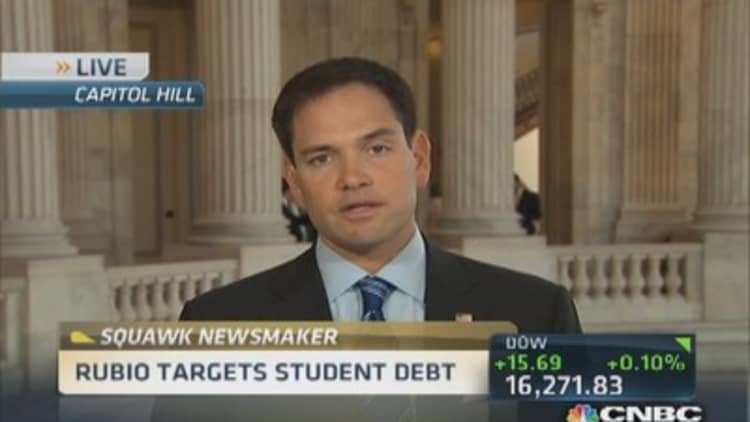
For Sen. Marco Rubio, student loan debt is not only a drag on the economy, but a personal issue. When he was sworn into office in January 2011, he owed more than $100,000 in student loans.
"So I'm keenly aware and sensitive to it," the 42-year-old Florida Republican told CNBC on Wednesday. "At one point in my life, it was the single-highest expenditure in our personal budget."
Seeking to help reduce student loan debt and provide student protections, Rubio, along with Rep. Tom Petri, R-Wis., will introduce a student loan bill on Wednesday. Rubio called for "income share agreements" between graduates and investment groups, in which graduates would make loan payments over a defined period of time in proportion to their income. So the more you make in a given month, the more you would pay back. The less you make, the less your monthly payment will be.
Read More
"For the investment group, they may make more money than they invested in the student. They may lose. That's the risk they take. For the student, they may wind up paying more than what they would have, but they may end up paying a lot less," Rubio told CNBC's "Squawk on the Street."
"The bill is designed to create a legal framework so we can encourage more entities, more investment groups to step into this field and help people with an alternative to the college loans that we currently have," he said.
Read MoreFinancial aid fine print for the uninitiated
Rubio acknowledged the bill might not help the majority of students, though. Investment will likely skew toward those pursuing careers in science, technology, engineering and math, he said.
"I do think it will likely reward those who are going into fields that are highly compensated," he said. "It will in fact serve as an incentive for more students to graduate with degrees that are ultimately turned into employment as opposed to large number of students now that are graduating in fields that don't lead to jobs."
—By CNBC's Drew Sandholm. Ben Thompson contributed to this report.


